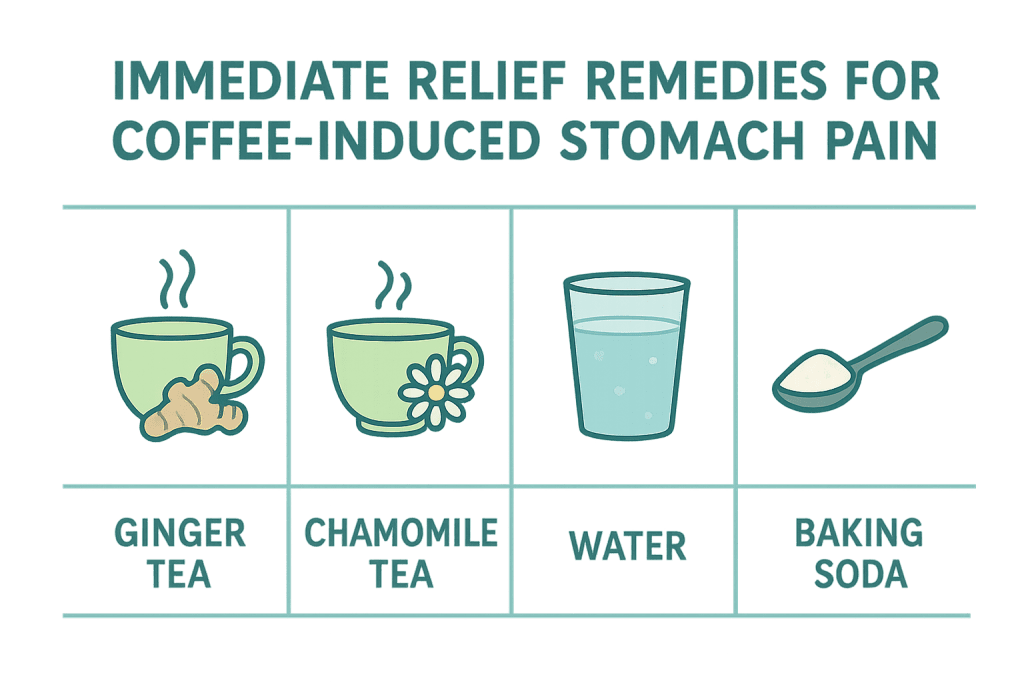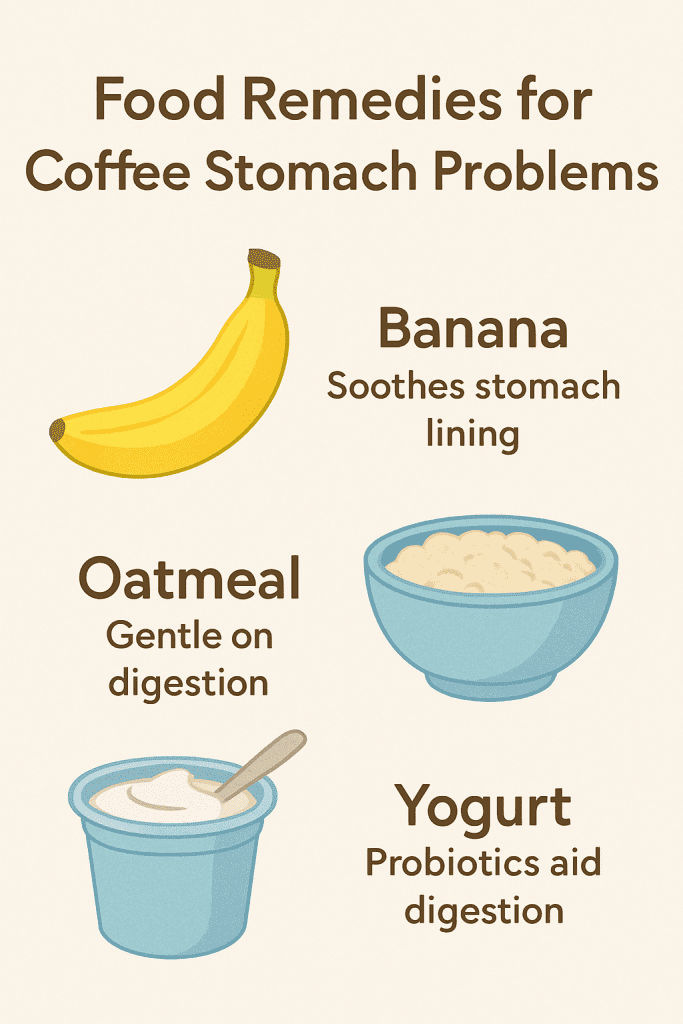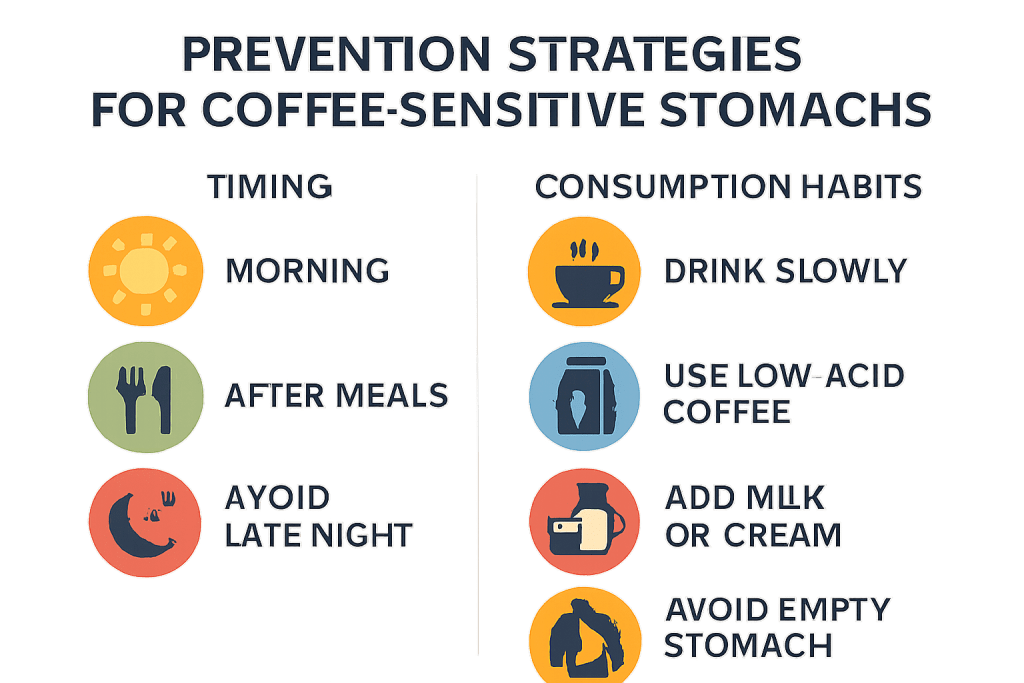
Before trying any of these remedies, it’s essential to consult a healthcare professional to ensure they are safe and suitable for your individual health needs. That familiar burn in your stomach after your morning cup of coffee doesn’t have to ruin your day. Coffee lovers everywhere often experience digestive discomfort, but effective remedies for stomach problems caused by excessive coffee consumption can provide quick and significant relief. This guide covers proven solutions that work fast and help you continue enjoying your favourite beverage without the painful side effects, giving you hope for a more comfortable coffee experience.
The Potential Benefits of Coffee for Digestive Health
While coffee can cause digestive discomfort, it also has potential benefits for digestive health. Understanding these mechanisms is crucial for selecting the most effective remedies for stomach issues resulting from excessive coffee consumption. This knowledge empowers you to take control of your digestive health and make informed decisions about your coffee consumption.
The Role of Caffeine in Digestive Distress
Caffeine acts as a powerful stimulant that significantly increases stomach acid production. Your digestive tract responds to caffeine by ramping up gastric acid secretion, which can irritate the stomach lining and cause painful symptoms. This stimulation also speeds up digestive contractions, leading to cramping and discomfort in individuals who are sensitive to it.
The effects become more pronounced when you consume multiple cups or drink coffee on an empty stomach. Caffeine sensitivity varies between individuals, with some experiencing symptoms from just one cup, while others can tolerate several servings daily.
Coffee Acidity and Stomach Irritation
Coffee naturally contains acids that contribute to its distinctive flavour but can cause discomfort in sensitive stomachs. The pH level of coffee ranges from 4.5 to 5.2, making it significantly more acidic than neutral water. Chlorogenic acids and quinic acids in coffee beans stimulate additional stomach acid production, creating a double burden for your digestive system.
These natural acids can break down the protective mucosal barrier in your stomach, leading to inflammation and irritation. Light roast coffees contain higher acid levels than dark roasts, explaining why some people tolerate certain coffee types better than others.
Common Additives That Worsen Symptoms
Many coffee drinkers unknowingly make their stomach problems worse by adding certain ingredients. Milk and cream can trigger symptoms in people with lactose intolerance, while sugar and artificial sweeteners may cause bloating and gas. High-fat creamers can slow digestion and increase the time acidic coffee remains in your stomach.
Some people find that switching to plant-based milk alternatives helps reduce symptoms, though individual reactions vary. The key is identifying which additives affect you personally and making appropriate substitutions.
Immediate Relief Remedies for Coffee Stomach Pain
When coffee-induced stomach pain strikes, these proven remedies for stomach problems caused by excessive coffee provide fast and effective relief. Acting quickly can prevent symptoms from worsening and help you feel better within minutes.

Fast-Acting Solutions to Soothe Your Stomach
Herbal Tea Solutions for Quick Relief
Ginger tea stands out as one of the most effective herbal remedies for stomach problems caused by coffee. Its natural anti-inflammatory properties help reduce stomach irritation while promoting healthy digestion. Steep fresh ginger slices in hot water for 10-15 minutes, or use ginger tea bags for convenience.
Chamomile tea offers another excellent option for soothing an upset stomach after too much coffee. This gentle herb relaxes stomach muscles and reduces inflammation in the digestive tract. Drink it warm, but not hot, to prevent further irritation of your stomach. Liquorice root tea offers protective benefits for your stomach lining, although it should be used sparingly. Avoid peppermint and spearmint teas, as they can exacerbate acid reflux symptoms despite their reputation for providing digestive relief.
Hydration and Dilution Strategies
Water serves as your first line of defence against coffee-related stomach discomfort. Drinking 8-10 glasses of water helps dilute stomach acid and flush irritating compounds from your system. Sip slowly rather than gulping large amounts, which can cause additional discomfort. Proper hydration supports your body’s natural healing processes and prevents the dehydration that often accompanies caffeine consumption. Room temperature or slightly warm water works best, as icy water can shock your already irritated stomach.
Proper hydration supports your body’s natural healing processes and prevents the dehydration that often accompanies caffeine consumption. Room temperature or slightly warm water works best, as icy water can shock your already irritated stomach.
Food-Based Remedies
Bananas provide quick relief by naturally neutralising excess stomach acid. Their alkaline properties help balance your stomach’s pH levels while providing gentle nutrition. Eat one ripe banana slowly, chewing thoroughly to maximise its acid-neutralising effects.
Oatmeal creates a protective coating on your stomach lining, reducing irritation from coffee acids. Choose plain oatmeal without added sugars or spices that might further upset your stomach. The soluble fibre in oats also helps regulate digestion and promote gut health.
Plain yoghurt with live probiotics can help restore healthy bacteria in your digestive system. Choose unsweetened varieties to avoid adding extra sugar that might worsen symptoms.

Natural Foods to Neutralize Stomach Acid
Natural Supplements and Alternatives
Baking soda offers rapid relief by neutralising stomach acids in your coffee. Mix 1/8 teaspoon in a glass of water and drink slowly. This remedy works within 10-15 minutes but should not be used regularly due to its high sodium content. It’s essential to note that excessive use of baking soda can lead to electrolyte imbalances and other health issues; therefore, it’s best to use this remedy sparingly and under the guidance of a healthcare professional.
Aloe vera juice helps soothe inflammation and promote healing in the digestive tract. Start with small amounts to test your tolerance, as some people experience mild laxative effects.
Prevention Strategies for Coffee-Sensitive Stomachs
While these remedies can provide relief, it’s important to remember that moderation is key. Consuming too much coffee can lead to digestive discomfort, so it’s essential to strike a balance between your love for coffee and your digestive health. These strategies help you enjoy coffee while protecting your digestive health, making you feel proactive and in control of your coffee experience.
Coffee Selection and Preparation Methods
Dark roast coffee contains significantly less acid than light roast varieties, making it easier on sensitive stomachs. The longer roasting process breaks down many acid-producing compounds while maintaining caffeine content. Choose dark roast beans when possible to reduce your risk of stomach irritation.

Choose the Right Coffee for a Gentle Sip
Cold brew coffee represents the gentlest option for coffee lovers with sensitive digestive systems. The cold brewing process extracts fewer acids, resulting in a smoother, less irritating beverage. Cold brew typically has 60-70% less acid than hot-brewed coffee.
Low-acid coffee brands specifically process their beans to reduce acidity levels. These specialty coffees are more expensive but offer significant relief for individuals who experience regular stomach issues.
Timing and Consumption Habits
Never drink coffee on an empty stomach, as this maximises acid production and irritation. Wait at least 30-60 minutes after eating before having your first cup of coffee. This simple change alone prevents many cases of coffee-related stomach problems.
Limit your daily coffee intake to 1-2 cups to avoid overwhelming your digestive system. Spacing out your consumption throughout the day rather than downing multiple cups reduces the burden on your stomach.
Drink coffee slowly and mindfully, rather than gulping it down quickly. Fast consumption increases the likelihood of swallowing air, which can contribute to bloating and discomfort.
Alternative Coffee Options
Decaffeinated coffee removes most of the caffeine while retaining the coffee flavour, although it still contains some acids. Many people with severe caffeine sensitivity find that decaf helps reduce their symptoms significantly.
Adding milk or cream to regular coffee helps neutralise acidity, although this is not effective for people with lactose intolerance. Plant-based milk alternatives, such as oat milk or almond milk, can provide similar acid-neutralising benefits.
Coffee substitutes, such as chicory root, provide similar flavours without the digestive stress. These alternatives work well for people who need to avoid coffee entirely while maintaining their morning routine.
Long-term Digestive Health Considerations
Managing remedies for stomach problems after consuming too much coffee requires understanding your digestive patterns and health status. Long-term solutions focus on building tolerance safely while recognising when professional help is needed.
Understanding Individual Sensitivity Levels
Coffee sensitivity varies dramatically between individuals due to genetic factors, age, and overall health status. Some people metabolise caffeine quickly, while others process it slowly, resulting in different tolerance levels. Stress levels also significantly impact how your stomach responds to coffee consumption.
Age-related changes in digestion often result in a decrease in coffee tolerance over time. What you could drink comfortably in your twenties might cause problems in your forties or beyond.
When Coffee Problems Indicate Larger Issues
Persistent stomach problems after coffee consumption may signal underlying digestive conditions like GERD, gastritis, or ulcers. Coffee can exacerbate these conditions rather than directly cause them. If you experience regular symptoms, your coffee sensitivity might be revealing a more serious health issue.
Pay attention to symptoms that occur with or without coffee consumption. Digestive problems that persist despite your coffee intake warrant a medical evaluation.
Building Coffee Tolerance Safely
Gradually increasing coffee consumption allows your digestive system to adapt slowly. Begin with small amounts of low-acid coffee and closely monitor your body’s response. Keep a detailed log of what you drink and how you feel to identify patterns.
Focus on optimising your overall digestive health through proper nutrition, hydration, and stress management. A healthy gut is more resilient to the potentially irritating effects of coffee.
Expert Tips for Coffee Lovers with Sensitive Stomachs
Professional recommendations for managing stomach problems after consuming excessive coffee emphasize the importance of quality, timing, and lifestyle factors. These evidence-based strategies help maximise your coffee enjoyment while minimising digestive discomfort.
Professional Recommendations
Medical professionals consistently advise against drinking coffee on an empty stomach. This single change prevents the majority of coffee-related digestive problems. Eating a small snack 15-30 minutes before coffee provides protective benefits for your stomach lining.
Choose organic, high-quality coffee beans when possible, as lower-quality beans often contain more stomach-irritating compounds. Freshly ground coffee typically causes fewer digestive issues than pre-ground varieties.

Habits to Protect Your Digestive Comfort
Quality and Processing Considerations
The quality of coffee beans significantly impacts their effect on sensitive stomachs. Single-origin beans often provide more consistent results than blends, making it easier to identify which varieties work best for you. Shade-grown coffee typically contains fewer harsh compounds than sun-grown varieties.
Storage methods affect the acidity levels of coffee over time. Store beans in airtight containers, away from light and heat, to prevent the development of additional irritating compounds.
Lifestyle Modifications Beyond Coffee
Exercise timing relative to coffee consumption affects digestive comfort. Avoid vigorous exercise immediately after drinking coffee, as it can increase the risk of acid reflux. Light walking after coffee consumption can aid digestion.
Sleep quality impacts your stomach’s sensitivity to coffee and other irritants. Poor sleep increases the likelihood and severity of digestive problems. Prioritise consistent sleep schedules to support overall digestive health.
When to Seek Medical Attention
Recognising the symptoms helps you know when remedies for stomach problems caused by excessive coffee consumption require professional medical evaluation. Some digestive symptoms indicate emergencies that need immediate attention.
Warning Signs Requiring Professional Help
Severe stomach pain that develops quickly or worsens rapidly requires immediate medical attention. Vomiting blood or material that looks like coffee grounds indicates severe internal bleeding. Black, sticky, unusually smelly stools also suggest internal bleeding and need emergency evaluation.
Persistent stomach pain lasting more than 24 hours should prompt a visit to a doctor. Unexplained weight loss, difficulty swallowing, or changes in bowel habits warrant professional evaluation. Dehydration from vomiting or inability to keep fluids down requires medical intervention.
Questions to Ask Your Healthcare Provider
Document your symptoms carefully before your appointment, including timing, severity, and potential triggers. Bring a list of all medications and supplements you take, as these can interact with the effects of coffee. Ask about underlying conditions that might make you more sensitive to coffee.
Discuss appropriate dietary modifications and whether you need to eliminate coffee. Your doctor can help determine if your symptoms indicate a serious condition requiring treatment.
Remedy Effectiveness and Safety
Most natural remedies for coffee stomach problems are safe for occasional use. Herbal teas, such as ginger and chamomile, can be consumed regularly without side effects. However, remedies like baking soda should be used sparingly due to their high sodium content.
Combining multiple remedies often provides better relief than using single treatments. Start with the gentlest options, such as water and herbal tea, before trying stronger interventions. If symptoms persist despite home remedies, seek professional medical evaluation.
The key to managing stomach problems after consuming too much coffee lies in understanding your tolerance and selecting appropriate solutions. With the right approach, most coffee lovers can continue to enjoy their favourite beverage while maintaining digestive comfort.
Frequently Asked Questions
Common questions about remedies for stomach problems after too much coffee reflect widespread confusion about coffee’s digestive effects. Understanding the facts helps you make informed decisions about your coffee consumption.
Common Concerns and Misconceptions
Coffee sensitivity doesn’t necessarily mean you must give up coffee entirely. Many people successfully manage their symptoms through proper selection, timing, and preparation methods. Expensive, low-acid coffees offer genuine benefits for individuals with sensitive stomachs, although cheaper alternatives, such as cold brew, can be equally effective.
Building tolerance to coffee is possible for many people through gradual exposure and lifestyle modifications. However, some individuals with underlying digestive conditions may need to avoid coffee altogether.






